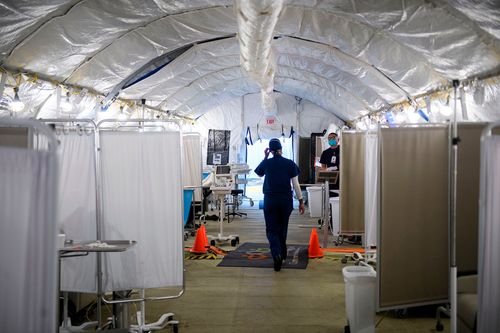A year fighting a global pandemic leaves US hospitals in shambles, new report finds

Burned out medical staff suffering from trauma and in some cases PTSD, the erosion of public trust in hospitals, and frustration over the “unpredictable and insufficient” supply of vaccines are just some of the problems outlined in a new report on US hospitals released by the Department of Health and Human Services inspector general Wednesday.
“[Hospitals] reported challenges largely related to the ongoing intensity of having to deal with Covid for a year. That has them grappling with challenges that were brought with Covid, but also exacerbated longstanding challenges in healthcare delivery, staffing, financial stability,” Ann Maxwell, assistant inspector general for evaluations and inspections, told CNN. “Then… you’ve got the added strain of the vaccination efforts, which are a new addition.”
The report surveyed more than 300 hospitals across the country from February 22-26 on how the coronavirus pandemic has impacted them. It paints a dire picture of the toll a year of treating a global pandemic has taken on the America’s health system and highlights the stress that operating in “survival mode” for such a lengthy period has caused those within it.
“This [pandemic] has really burnt out the health care industry,” one hospital president told HHS. “I am concerned about what we are going to do about making people want to go into health care as a profession.”
Hospitals reported that long hours, more shifts, time away from family and increased responsibilities caused by the pandemic left staff “exhausted, mentally fatigued, and sometimes experiencing possible PTSD.” Some administrators pointed to the increased deaths, including among coworkers, and the fact that some staff were the only person present at the time of death due to pandemic restrictions as having a significant toll on many.
“Long-term solutions for staff fatigue, compassion fatigue, and possible PTSD will need to be identified so that we can help our staff be able to care for themselves, their families, and our patients,” one administrator told HHS.
The challenges faced by medical staff have lead to a higher than normal turnover rate and created shortages that in some cases impacted the quality of patient care, according to the report.
Some hospital administrators also reported new questions from their patients on “whether hospitals are safe and can keep patients safe,” due to fears over contracting the virus in the hospital. Some speculated this might be “in part because of the confusion over evolving public health guidelines.”
Vaccine complications
Without clear guidance from the federal government, hospitals were forced to create their own infrastructures for distributing and storing coronavirus vaccines, efforts which in many cases exacerbated staff shortages caused by the pandemic, according to health officials. Hospitals expressed frustration to HHS over the supply of the vaccines— reporting that it was unpredictable, that “they often get little advance notice” about changes in quantities, and what was received in term of doses was not always what was expected.
H
ospitals reported that the initial vaccine rollout caused increased challenges for a variety of reasons, including vaccine hesitancy among staff. Administrators from a number of hospitals said that 1/3 of their staff refused to be vaccinated due to a lack of trust over the rapid vaccine development and effectiveness, among other reasons. Additionally, inconsistent information and differing guidelines over who is eligible for the vaccine from federal, state and local government caused confusion and additional stress to already overburdened hospitals.
Because there are so many disconnected data systems for various levels of government, hospital staffers already spread thin have found themselves spending hours inputting the same vaccination information over and over again.
Hospitals also reported difficulties in vaccinating rural as well as economically disadvantaged areas and said they had to add extra steps to make sure the vaccine was accessible to all Americans.
Delayed care and mental health
Administrators also sounded alarms over patients putting off routine care and checkups, including cancer screenings and cardiology tests for various reasons during the pandemic, noting that “serious diagnoses may go unidentified” and lead to higher hospitalization rates down the road. One administrator told HHS the patients they were seeing for diabetes and cardiac management were sicker after missing prior appointments.
“Things that are elective, if not dealt with over time, are no longer elective,” an emergency preparedness director told HHS.
“Delayed or forgotten routine health care means that people present in a later stage of their disease, which is concerning all around for the complexity of care that they will need,” Maxwell said. “When you’re talking about cancer and diabetes—these are serious health conditions…health outcomes are better if people are able to access routine care when they first have symptoms.”
Over the past year, health officials across the country have repeatedly warned of the long term mental toll that online learning, lockdowns, burnout and reduced social interaction will have on Americans. Hospitals echoed this in the report, raising concern that they might not have the resources to meet the “greater mental and behavioral needs” created by the pandemic.
What’s next?
According to Maxwell, the goal of the two surveys— the first conducted a year ago—is to help the country “improve its response and protect the health and safety of the people that HHS serves.”
“
Our singular goal was to be helpful to provide a snapshot point in time, feedback for policymakers at all levels of government that are still in a response stance, that are still trying to figure out in this moment, what are the policies and what are the support they need to be providing to frontline responders like hospitals to make sure that they can actually provide the care needed to their patients, take care of their staff, and take care of their communities,” Maxwell said.
While the hospitals have taken steps to try and address these challenges, they also outlined additional ways that the government could help support their effort, including providing hospitals with the knowledge and training on dealing with burnout.